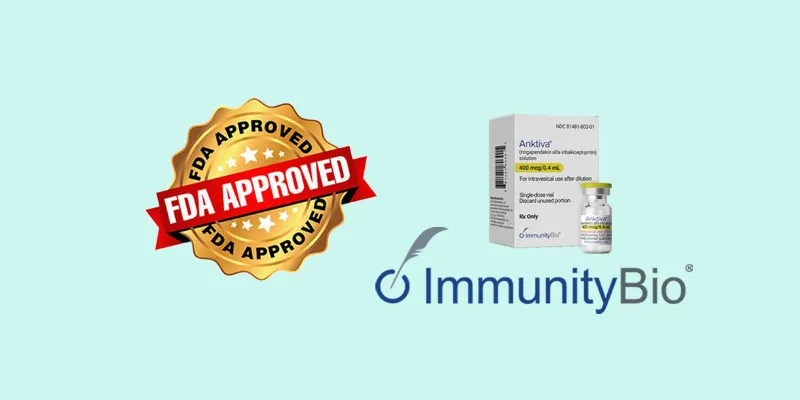First-of-Its-Kind Immunotherapy Anktiva Receives FDA Approval for Bladder Cancer

23 April 2024
The FDA has approved Anktiva®, a novel immunotherapy for treating BCG-unresponsive non-muscle invasive bladder cancer (NMIBC). This first-in-class IL-15 superagonist stimulates immune cells to attack cancer cells, offering a promising alternative to traditional treatments.
ImmunityBio announced that the US Food and Drug Administration (FDA) has approved Anktiva® (nogapendekin alfa inbakicept-pmln), a novel immunotherapy for the treatment of BCG-unresponsive non-muscle invasive bladder cancer (NMIBC) with carcinoma in situ (CIS), with or without papillary tumors. Anktiva has shown a high rate of durable responses and is expected to be available in the US by mid-May 2024.
A New Class of Immunotherapy
Developed by ImmunityBio, Inc., Anktiva® is the first of its kind as an interleukin-15 (IL-15) superagonist. This breakthrough therapy harnesses the body's immune system, enhancing the functions of natural killer (NK) cells and CD8+ killer T cells, crucial components in combating cancer. Anktiva® also stimulates CD4+ T helper cells, amplifying the immune response and fostering the proliferation of memory killer T cells—a strategy mimicking the biology of dendritic cells.
“The FDA’s approval of Anktiva marks our launch of a next-generation immunotherapy beyond checkpoint inhibitors. Anktiva not only proliferates and activates the patient’s own NK cells and CD8+ killer T cells, but also activates CD4+ T helper cells, thus enhancing the proliferation of memory killer T cells,” said Dr. Patrick Soon-Shiong, Executive Chairman and Global Chief Scientific at ImmunityBio.
The combination of these mechanisms forms what ImmunityBio refers to as the "triangle offense" of tumor cell elimination, providing a robust foundation for this innovative treatment approach, which has shown potential beyond traditional T cell therapies.
Clinical Trials and Efficacy
The efficacy of Anktiva was evaluated in a pivotal phase 2/3 clinical trial, QUILT-3.032, which involved 77 patients with high-risk NMIBC. The trial demonstrated a complete response rate of 62%, with durations of complete response extending beyond 47 months for some patients, highlighting the durable nature of the therapy. Notably, 58% of patients achieved a duration of response lasting at least 12 months, and 40% extended beyond 24 months.
Safety profiles were favorable, with the therapy well-tolerated among participants. Adverse events were generally mild, with the most common being related to intravesical BCG administration, such as dysuria and hematuria. Severe adverse reactions occurred in a small fraction of the cohort, enabling most patients to continue with their treatment regimes.
Implications for NMIBC Management
The approval of Anktiva® offers new hope to patients with NMIBC, a condition traditionally treated with BCG therapy. Despite its effectiveness, BCG fails in approximately 30-40% of cases, often leading to recurrence and necessitating invasive procedures like cystectomy. Anktiva provides an alternative that not only reduces the likelihood of recurrence but also the need for such radical treatments.
Experts in the field, including Dr. Ashish Kamat from the University of Texas MD Anderson Cancer Center, have hailed the approval as a significant achievement. “This new therapy builds upon our experience with BCG and offers a much-needed option for patients struggling with treatment-resistant forms of bladder cancer," stated Dr. Kamat.
Global Impact and Future Prospects
With bladder cancer being the tenth most commonly diagnosed cancer worldwide, the introduction of Anktiva could dramatically change the treatment landscape. ImmunityBio is exploring the potential of Anktiva in other cancer types and as a part of therapeutic cancer vaccines, targeting multiple tumor types and possibly benefiting patients with a genetic predisposition to cancer, such as those with Lynch syndrome.











Comments
No Comments Yet!